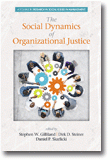
The Social Dynamics of Organizational Justice
Edited by:
Stephen W. Gilliland, University of Arizona
Dirk D. Steiner, Universite de Nice-Sophia Antipolis
Daniel P. Skarlicki, The University of British Columbia
A volume in the series: Research in Social Issues in Management. Editor(s): Eden B. King, Rice University. Quinetta M. Roberson, Michigan State University. Mikki R. Hebl, Rice University.
Published 2015
This eighth volume in the Research in Social Issues in Management series explores a variety of social relations to expand our thinking about organizational justice, which is fundamentally based on relationships between organizational authorities and the employees of the organizations. These relationships also emphasize the roles of various actors and suggest fairness perspectives other than that of subordinates’ perceptions of the treatment received from their superiors.
The 10 chapters of the volume are divided into two major sections plus a conclusion. The first section presents five chapters that bring new theoretical perspectives to bear on justice considerations. Topics treated throughout this section include conflicting perspectives on justice, psychological distance, greed, and punishment. The second section places emphasis on leaders’ or managers’ perspectives of justice, going back to some of the initial proactive roots of justice rather than on what has become the more traditional focus, that of subordinate perceptions or reactive justice. In the contributions comprising this section, leaders’ personalities, their motives, and their position as both superiors of some employees and subordinates of their own superiors are examined to provide new perspectives on the leadership role in justice matters.
The concluding chapter, by Brockner and Carter, comments on the collection of chapters and proposes extensions and alternative perspectives for consideration. This commentary chapter suggests that the volume surfs a fifth wave in the history of justice research as these chapters all examine justice as a dependent variable influenced by numerous factors.
CONTENTS
Preface. Part I: Linking Organizational Justice to Alternative Theoretical Perspectives. The Justice Tug-of-War: A Dyadic Approach to Conflicting Perceptions of Fairness, David B. Whiteside and Laurie J. Barclay. Using the Concept of Distance to Broaden the Horizons of Organizational Justice, Sana Rizvi and D. Ramona Bobocel. A Multiple Mediator Model of Trickle-Down Effects, David X. H. Wo and Maureen L. Ambrose. Justice, Relative Deprivation, and Blame: Disentangling Constructs to Understand Cognitive and Emotional Reactions to Greed, Stephen Gilliland and Jennifer Anderson. The Punitive Power Holder: Social Judgeability Increases the Severity of Punishment, Jan-Willem van Prooijen. Part II: Organizational Justice From Leaders’ and Managers’ Perspectives. Maintaining Justice: The Effect of Managerial Personality and Trait Activation on Procedural, Interpersonal, and Informational Fairness, Sheli D. Sillito Walker. Fair Leadership: A Proactive Approach to Organizational Justice, Danielle Jouglard and Dirk D. Steiner. Supervisors’ Struggle for Fair Resource Allocation, Riel Vermunt. The Social Dynamics of Justice: How Ex Ante and Ex Post Justice Interplay With Formal and Informal Elements of Management Control Systems, Natàlia Cugueró-Escofet and Josep Maria Rosanas Martí. Part III: Commentary and Perspectives. Toward the Fifth Wave: Justice as a Dependent Variable, Joel Brockner and Ashli Carter. About the Editors. About the Contributors.
-
Paperback9781623968601
Web price: $45.04 (Reg. 52.99)
-
Hardcover9781623968618
Web price: $80.74 (Reg. 94.99)
- eBook9781623968625

- BUS000000 - BUSINESS & ECONOMICS: General
- BUS085000 - BUSINESS & ECONOMICS: Organizational Behavior
- BUS030000 - BUSINESS & ECONOMICS: Human Resources & Personnel Management
-
 Diversity, Equity, and Inclusion Insights in Practice
Diversity, Equity, and Inclusion Insights in Practice
-
 Emerging Perspectives on Organizational Justice and Ethics
Emerging Perspectives on Organizational Justice and Ethics
-
 Perspectives on Gender and Work
Perspectives on Gender and Work
-
 Perspectives on Race in Organizations
Perspectives on Race in Organizations
-
 Pushing our Understanding of Diversity in Organizations
Pushing our Understanding of Diversity in Organizations
-
 The Future of Scholarship on Diversity and Inclusion in Organizations
The Future of Scholarship on Diversity and Inclusion in Organizations
-
 The Future of Scholarship on Race in Organizations
The Future of Scholarship on Race in Organizations

